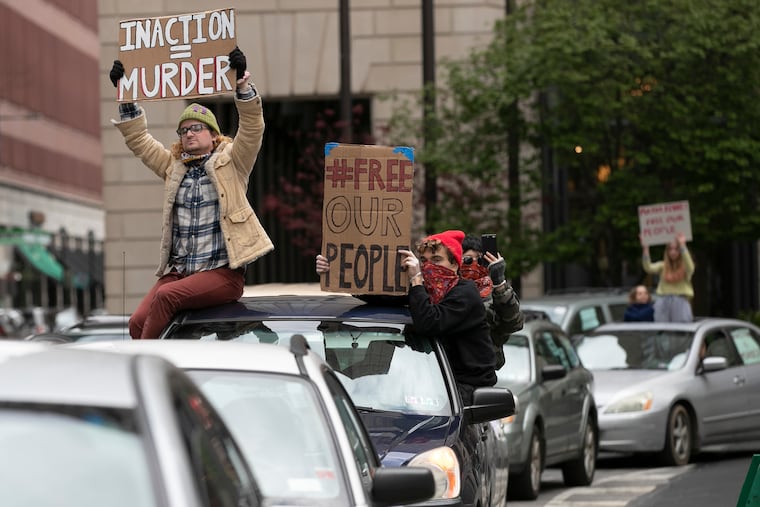Racing to avoid disaster behind bars, Philly released hundreds of inmates | Coronavirus Newsletter
Plus, why a scarcity in testing could make it harder to re-open parts of Pennsylvania

TL;DR: County jails are breeding grounds for disease, and experts say a COVID-19 outbreak behind bars could not only put hundreds of inmates at risk but also spread the virus to surrounding communities. This week, Philadelphia courts held the first hearings to review such cases, and over three days approved the release of more than 200 inmates.
Make sure you check Inquirer.com/coronavirus for the latest news, and please feel free to tell your family and friends to sign up.
Enjoy getting our journalism through email? You can also sign up for The Inquirer Morning Newsletter to get the latest news, features, investigations and more sent straight to your inbox each morning Sunday-Friday. Sign up here.
— Allison Steele (@AESteele, health@inquirer.com)
What you need to know:
🛑 More than 20,000 people in the U.S. have died from COVID-19, more fatalities than in Italy.
🔒 When Pennsylvania lifts the stay-at-home order, “it’s not going to be one grand opening, it’s going to go in a progressive fashion,” Pa. Health Secretary Rachel Levine said.
🏫 New York City Mayor Bill DeBlasio wants city schools, like those in Pennsylvania, to remain closed for the rest of the academic year.
👐 New Jersey will require those riding public transit to wear masks. The announcement came a day after SEPTA reversed a similar policy.
Local coronavirus cases
📈As of Saturday evening, there are close to 14,000 reported cases in the Philadelphia area. Track the spread here.
PHILADELPHIA: 6,022 confirmed cases (up 229 since yesterday)
SUBURBAN PA: 5,202 confirmed cases (up 594 since yesterday)
SOUTH JERSEY: 2,696 confirmed cases (up 196 since yesterday)
For weeks, advocates have warned that county jails are ticking time bombs when it comes to the spread of disease. Jails have high rates of population churn, and behind bars it’s impossible to maintain social distancing. Experts say a COVID-19 outbreak would threaten not only inmates and staff, but also the communities surrounding the jails, and in recent weeks, other cities and counties have thinned jail populations by releasing eligible prisoners.
In Philadelphia, courts last week held hearings that cleared the release for more than 200 inmates, like nonviolent offenders who had completed their minimum sentences and those being held on cash bail or low-level charges like drug possession. In deciding each case, judges weighed the circumstances of the alleged crimes, whether victims had expressed safety concerns, and if prisoners had stable homes to return to. But even with a deadly virus looming, the question of who would be better off outside of jail was not always easy to answer.
To understand how COVID-19 works and how far it has spread, more people need to be tested. But in Pennsylvania, health officials are missing key information about the coronavirus outbreak due to the continued scarcity of testing, and because they don’t have enough patient data from the tests that have been done.
Pennsylvania has tested less than 1% of the population, and experts say that’s just not enough to be able to make informed decisions about where to send resources or when to start re-opening communities. “We’re going to have to live with this epidemiological purgatory where we have some disease but not too much and where we have some social distancing but not too much,” said epidemiologist Donald Burke.
Helpful resources
What can help protect you from the coronavirus? Also, here’s how to make your own face mask.
What are the first symptoms of the coronavirus? Pink eye is also a possible early warning sign of coronavirus, eye doctors report.
Where can I get a coronavirus test?
Not sure what a medical term means? We have definitions for you.
Have another question? Our reporters have tracked down answers.
Let’s take a quick break
🏆 Fans will choose the greatest athlete in Philly sports history, using a 64-player, interactive bracket that launches on Inquirer.com Tuesday.
📰 From the Inquirer archives: A group of high school students helped give $30,000 to 13 Philadelphia charities.
🎥 Watch Groundhog Day this weekend as part of the “One Movie, One Philadelphia” series.
Social distancing tip of the day: Celebrate Easter with streamed services
More than 60 churches in and around the city will stream their weekend services online, offering hope and at least a small amount of connection as worshipers remain in their homes to prevent the spread of COVID-19.
Have a social distancing tip or question to share? Let us know at health@inquirer.com and your input might be featured in a future edition of this newsletter.
What we’re paying attention to
By the end of February, the White House’s public health team knew that schools and businesses would have to close. It took three weeks to persuade the president, according to a New York Times report.
The New Yorker on How Anthony Fauci became America’s doctor.
No, the coronavirus is not a good reason to eliminate cash. The MIT Technology Review explained why.
It’s not all horrible
Since the coronavirus shut down the region’s restaurants, some chefs have pivoted to selling specialty items, takeout or delivery, and in the case of one establishment, even board games. It’s a grind, and in most cases the revenue doesn’t move the needle, but it does keep the public happy and a few employees collecting paychecks.
News about coronavirus is changing quickly. Go to inquirer.com/coronavirus to make sure you are seeing the newest information.